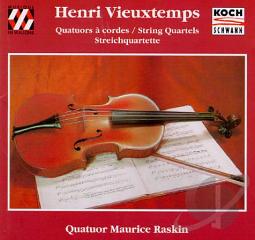Henri Vieuxtemps – String Quartets (1981)
Henri Vieuxtemps – String Quartets (1981)

01. Quartet No.2 in C major op.51 - I. Allegro assai [0:06:43.22] 02. Quartet No.2 in C major op.51 - II. Andante [0:10:13.33] 03. Quartet No.2 in C major op.51 - III. Scherzo [0:07:31.67] 04. Quartet No.2 in C major op.51 - IV. Finale [0:04:56.20] 05. Quartet No.3 in B flat major op.52 - I. Allegro con spirito [0:09:24.73] 06. Quartet No.3 in B flat major op.52 - II. Intermezzo [0:05:39.42] 07. Quartet No.3 in B flat major op.52 - III. Adagio non troppo [0:11:12.40] 08. Quartet No.3 in B flat major op.52 - IV. Finale (allegro vivace) [0:06:44.60] Quatuor Maurice Raskin
Henri Vieuxtemps (1820-1881) was born in Verviers, Belgium. He received his first violin instruction from his father, subsequently studying with Charles de Bériot. He toured Europe for several decades and was regarded as one of the leading violinists of his time. Schumann compared Vieuxtemps to Paganini, and Paganini, himself, was extremely impressed when he heard Vieuxtemps at his London debut in 1834. Vieuxtemps also devoted himself to composition, having studied composition with Simon Sechter in Vienna, and Anton Reicha in Paris. His violin concertos are still in the repertoire. In addition to this, he became an important teacher, founding the violin school in St. Petersburg and teaching at the Brussels Conservatory, where Eugène Ysaÿe was among his many students. Although the bulk of Vieuxtemps' compositions were for the violin, he often turned to other instruments, writing two cello concertos, a viola sonata and three string quartets among other things. For many years, he toured as the leader of a string quartet, championing the quartets of Beethoven in particular.
String Quartet No.2 was not published during his lifetime but is thought to have been composed been composed during the 1870’s. It is a sunny work, full of good spirits. Classically structured, the melodies are romantic. The opening Allegro assai, seems inspired by early Beethoven. The lovely Andante which follows shows the same inspiration. Not at all surprising for someone who championed Beethoven's quartets throughout Europe. Next comes a lively Scherzo, full of bounce. A gorgeous trio sections provides a fine contrast. The finale, an Allegro, is full of verve and elan. It brings the work to a rousing conclusion which is sure to garner loud applause from any audience. --- editionsilvertrust.com
download: uploaded yandex 4shared mediafire solidfiles mega zalivalka filecloudio anonfiles oboom








